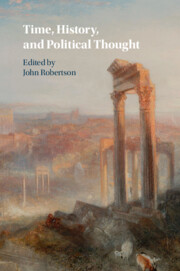Book contents
- Time, History, and Political Thought
- Time, History, and Political Thought
- Copyright page
- Contents
- Contributors
- Acknowledgements
- Note on References and the Bibliography
- Introduction: Time, History, and Political Thought
- 1 Out of Time? Eternity, Christology, and Justinianic Law
- 2 Historicity and Universality in Roman Law before 1600
- 3 ‘The Logic of Authority, and the Logic of Evidence’
- 4 Christian Time and the Commonwealth in Early Modern Political Thought
- 5 Politic History
- 6 Hobbes on the Theology and Politics of Time
- 7 The Recourse to Sacred History before the Enlightenment: Spinoza’s Theological–Political Treatise
- 8 Law, Chronology, and Scottish Conjectural History
- 9 Civilization and Perfectibility: Conflicting Views of the History of Humankind?
- 10 Kant on History, or Theodicy for Mortal Gods
- 11 Law’s Histories in Post-Napoleonic Germany
- 12 After Historicism: The Politics of Time and History in Twentieth-Century Germany
- 13 The Right to Rebel: History and Universality in the Political Thought of the Algerian Revolution
- Bibliography
- Index
11 - Law’s Histories in Post-Napoleonic Germany
Published online by Cambridge University Press: 08 June 2023
- Time, History, and Political Thought
- Time, History, and Political Thought
- Copyright page
- Contents
- Contributors
- Acknowledgements
- Note on References and the Bibliography
- Introduction: Time, History, and Political Thought
- 1 Out of Time? Eternity, Christology, and Justinianic Law
- 2 Historicity and Universality in Roman Law before 1600
- 3 ‘The Logic of Authority, and the Logic of Evidence’
- 4 Christian Time and the Commonwealth in Early Modern Political Thought
- 5 Politic History
- 6 Hobbes on the Theology and Politics of Time
- 7 The Recourse to Sacred History before the Enlightenment: Spinoza’s Theological–Political Treatise
- 8 Law, Chronology, and Scottish Conjectural History
- 9 Civilization and Perfectibility: Conflicting Views of the History of Humankind?
- 10 Kant on History, or Theodicy for Mortal Gods
- 11 Law’s Histories in Post-Napoleonic Germany
- 12 After Historicism: The Politics of Time and History in Twentieth-Century Germany
- 13 The Right to Rebel: History and Universality in the Political Thought of the Algerian Revolution
- Bibliography
- Index
Summary
Charlotte Johann explores the relationship between law and history articulated in a fierce debate between two of the most prominent legal scholars of nineteenth-century Germany: Friedrich Carl von Savigny, the leading exponent of historical jurisprudence, and Eduard Gans, the foremost advocate of Hegelian legal philosophy. Situating their confrontation in the aftermath of the Napoleonic occupation of German Europe, the chapter argues that the two thinkers used concepts of history to counter the rupturing effects of revolution and empire on the German legal system, albeit in radically different ways. Savigny proposed to re-build the German legal system based on the hermeneutically rigorous academic study of pre-revolutionary legal orders, especially classical Roman Law. Gans, by contrast, defended the primacy of legislation as a vehicle of legal continuity by grounding it in an origin story of the modern state. Johann challenges interpretations of the debate as simply a clash between liberal and conservative versions of law’s history. Rather, she suggests that the issue at stake was whether, or to what extent, politics and law share the same temporality – an issue that continues to preoccupy legal theorists and historians alike.
- Type
- Chapter
- Information
- Time, History, and Political Thought , pp. 237 - 258Publisher: Cambridge University PressPrint publication year: 2023

